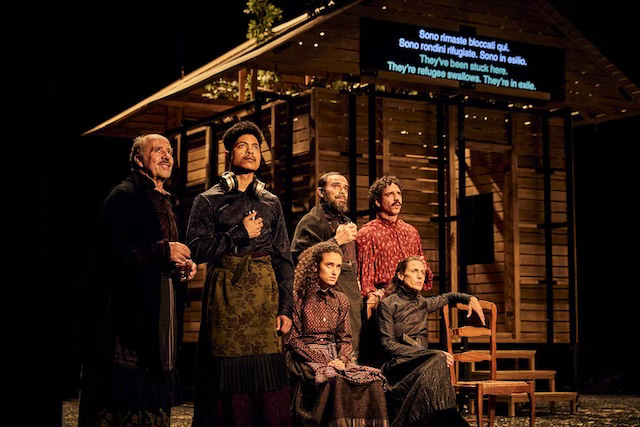Sometimes Art Can Be Timely and Relevant
The trick is not to sacrifice timelessness for timeliness
(HUDSON, N.Y.) - A couple of years ago in this space (has it really been that long?), I shared my general dislike of topical theater (and, perhaps, topical art more generally). Plays that speak or respond to issues of the moment are generally rushed and not artful, taking the short rather than the long view, and drawing their sustenance more from the emotional impact of their context, the immediate events they address, rather than taking a step back and telling a story with timeless resonance that may or may not reflect the (imagined) urgent concerns of their audience. The result tends to be agitprop, not art.
“Ripped from the headlines” is often viewed as a virtue of topical playwriting, as if it automatically gains points for being “relevant” to contemporary audiences. As I said previously, I prefer my art to be irrelevant, especially if it is grounded in timeless verities about the human condition – verities that may or may not resound with present-day audiences. The best-made plays, however, almost always do resound, which is why classic works by Shakespeare, Chekhov, Ibsen and the like, along with modern works by Harold Pinter, Sam Shepard, August Wilson, and Wendy Wasserstein retain their popularity and “marketability.” These are plays populated by simulacra of real people in real situations, often flawed people. And as such, the plays are more about humanity than they are about social or political issues -- although in many cases, they are sparked by immediate concerns or take contemporary problems as their launching point, but soon transcend that limited focus to – like most great novels – create drama out of everyday stuff (and not, as is often the case, to dramatize issues, like some multimedia presentation of an op-ed article).
I RECENTLY SAW THIS phenomenon played out in a few works for stage: Giacomo Meyerbeer’s nineteenth-century opera, Le Prophète, at Bard Fisher Center, and the Portuguese drama, Catarina and the Beauty of Killing Fascists by Tiago Rodrigues (2020), at PS21 in Chatham, N.Y.
The latter was the more immediate commentary on our political world, staged just weeks before would-be fascist dictator Donald Trump (he who said, “I will be a dictator on day one” and “you won’t ever have to vote again” if he is elected president this coming November) nearly succumbed to an assassin’s bullet. Rodrigues’s drama, staged and acted brilliantly at PS21, never took the easy way out in its portrayal of a Shirley Jackson-like annual ritual wherein a rural Portuguese family takes it upon themselves to extract the ultimate price from those guilty of aiding and abetting the fascistic Salazar regime. With its frequent invocations of Bertolt Brecht, the play practically invited the audience to help break the fourth wall and, without giving too much away, that is exactly what the play brings about by the end. Whether an audience member got verbally or physically sucked into the drama or not, a catharsis was had by all.
This was somewhat less the case in Meyerbeer’s rarely staged opera, which ostensibly portrayed how easily a populace can be swayed by religion-fueled demagoguery. At four-hours-plus, the plot was not always easy to follow (at least not for me), but one got the basic sense that the story illustrated how a little Machiavellianism can lead to a lot of turmoil and violence during an unsettled time when truth is but a game played by those in power (or by those who would attain power). Again, the notions were resonant, but the overwhelming takeaway was the beauty of Meyerbeer’s score and the virtuosity of the lead vocalists, who achieved their greatest musical moments unfettered by the orchestra, when they were left free to exercise their skills and talent a cappella. All this despite what was being acted out as a story. In this case, formal virtues outweighed the work’s “meaning” as such, which is in keeping with Meyerbeer’s relatively “light” opera (as opposed to “heavier” works made by his contemporaries and those who followed in his wake).
GEORGE HARRISON BOOK UPDATE
The first review of my upcoming George Harrison book -- Within You Without You: Listening to George Harrison (Oxford University Press) – came out last week in Publishers Weekly, which called it “a boisterous celebration of George Harrison” ... an “astute analysis of Harrison’s musical evolution and delightful turns of phrase” ... “this loving ode will captivate Harrison’s fans.” While the book doesn’t publish until October 1, it is currently available for pre-order from your local, independent bookseller -- or from any of the major online retailers. A website for the book will soon launch here.
Hey, did you like this edition of Everything Is Broken? If so, please consider clicking on the “LIKE” button at the very end of this message. It matters to the gods of Substack.
Roll Call: Founding Members
Anne Fredericks
Anonymous (7)
Erik Bruun
Nadine Habousha Cohen
Fred Collins
Fluffforager
Benno Friedman
Amy and Howard Friedner
Jackie and Larry Horn
Richard Koplin
Paul Paradiso
Steve and Helice Picheny
David Rubman
Spencertown Academy Arts Center
Elisa Spungen and Rob Bildner/Berkshires Farm Table Cookbook
Julie Abraham Stone
Mary Herr Tally





